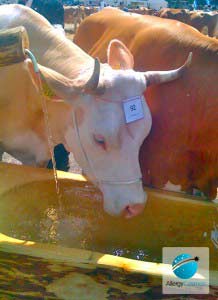Milk is a common trigger for asthma symptoms. Proteins in milk may act as true allergens, and milk can also create mucous which can make symptoms worse. So it's intriguing to learn that one well-respected study has shown that drinking farm (raw) milk can have a protective effect against both asthma and hayfever. Dr. Marco Waser of the Institute of Social and Preventative Medicine at the University of Basel, Switzerland, and colleagues in Europe and the USA studied a group of 15,000 children aged 5-13 from farming, rural and urban communities. Those who drank raw milk had a 25% reduced chance of getting asthma and a 50% reduced chance of getting hay fever. No such protection was seen against eczema. Some of the milk was boiled before the children drank it - but the protective effect was still found. This boiling wasn't the same as commercial pasteurization so the milk was still 'raw'. The work was part of the PARSIFAL (Prevention of Allergy - Risk Factors for Sensitization Related to Farming and Anthroposophic Lifestyle) study.
The researchers wondered whether there are protective substances in raw milk. There could be specific proteins or 'friendly bacteria' which are destroyed in pasteurization. Another part of the PARSIFAL project showed that children with a certain variant of an immune system gene benefited most from raw milk in terms of protection against asthma and hay fever. Putting these findings together, and further research could lead to the development of a safe version of raw milk that could help protect against allergy.
The researchers were adamant that people should not start their children on raw milk in the hope of helping them avoid developing allergies. In England and Wales, the supply of raw milk is very strictly controlled and it accounts for only 0.01% of all milk consumed. Raw milk may contain harmful bacteria and must be labelled with a health warning. It can only be sold at the farm gate, by milkmen, and at farmers' markets - so you can't get it in the shops. According to the Food Standards Agency, there were only 102 producers of raw milk in England and Wales, which is down from 570 in 1997. The sale of raw milk has been illegal in Scotland since 1983 following a number of cases of illness related to its consumption. Since the ban, the incidence of such illness has fallen dramatically. In fact, the government has three times proposed a ban on raw milk in England, Wales, and Northern Ireland, but was opposed by consumers and producers. There is, indeed, a small - but vociferous - raw milk movement on either side of the Atlantic. Some claim it does protect against allergy, as was found by the PARSIFAL researchers. For most people, though, surely the risks of consuming raw milk would outweigh the potential benefits?
Ref.: Inverse association of farm milk consumption with asthma and allergy in rural and suburban populations across Europe. Waser et al. Clinical and Experimental Allergy. 37, 661-670. May 2007.




